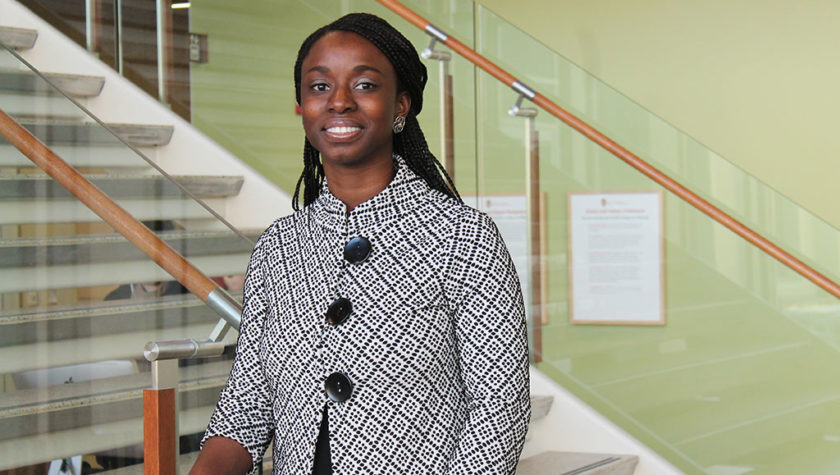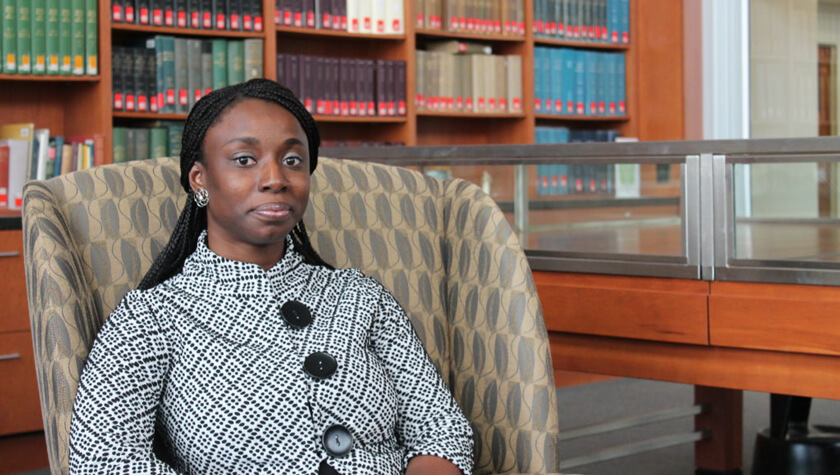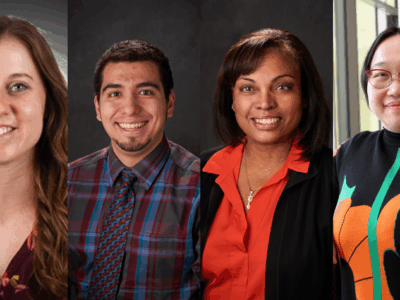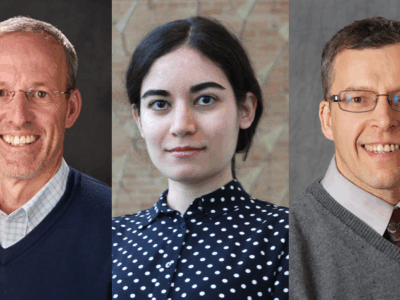
10
September

Assistant Professor Olufunmilola Abraham receives American Cancer Society grant to research what teens know about cancer
By Hanzhu Tang
Nearly everyone has had their life touched by cancer, either through a friend or a family member, or even through their own diagnosis. In fact, the U.S. National Cancer Institute’s surveillance found that an average of one in three people will develop cancer in their lifetime.
But for being one of the most common chronic diseases, education about cancer and its prevention is limited. We all know not to smoke, but what else can we do?
“Even as a pharmacist, I feel like I didn’t think much about cancer until I had a family member die of cancer — my aunt,” says Olufunmilola Abraham (MS ’11, PhD ’13), assistant professor in the Social and Administrative Sciences Division of the University of Wisconsin–Madison School of Pharmacy. “After that, I started to think more about it.”
To better understand and enhance cancer education within the state, Abraham secured a grant from the American Cancer Society to fuel her research into what Wisconsin youth ages 13 to 18 know about cancer and cancer prevention.
“What are their thoughts about cancer? How do they want to be learning about it? What kinds of cancers do they typically hear about or want to hear about it? We can take what we learn from them and incorporate it into their health classes,” says Abraham. “There is not a lot of cancer education done with youth in the U.S., but this is a way to change that.”
Uncovering the gaps in health education
With the help of research specialists and students in the Health Services Research in Pharmacy graduate program, Abraham will be traveling to middle and high schools around Wisconsin through the fall and spring semesters to hold focus groups and conduct surveys to get a sense of what teenagers understand — and don’t understand — about cancer.
“I’m primarily targeting high schoolers for this research because it’s the prime age before they reach independence,” says Abraham. What they know about these diseases as teenage behaviors are potential indicators of lifestyle choices as independent adults.
Students can choose to participate in a survey, a focus group, or both. For the survey, they will answer a series of questions to help researchers to evaluate their current awareness of cancer, such as where they get their information, what types of cancers have impacted their lives, what outstanding questions they might have, and how they want to receive the answers to those questions.
“Teachers don’t necessarily feel equipped to teach students about cancers or what the healthy behaviors are that can hopefully prevent them.”
–Olufunmilola Abraham
The focus groups will explore similar themes, but in more detail. In groups of eight to 10, students will sit down with Abraham or one or more members of her researchers and answer questions, put ideas on a whiteboard, and have a free-flowing conversation about cancer topics.
“Working directly with youth is the fun part of my research,” says Abraham. “I like being part of that data collection process, and during analysis, it helps to understand the context of the conversation.”
Although it’s one of her favorite research activities, working with teenagers in can also be a challenge. Depending on the different personalities in the group, it is can be difficult for the students to open up and participate openly in the conversations. Through her research to create an opioid medication safety video game for high schoolers, she’s developed some strategies to get them talking.
“We find strategic ways to get them to feel comfortable opening up,” says Abraham. “We may have food, so we’ll be eating and chatting. We also make them use code names that they can call each other so they don’t have to use their real names.”
To honor the schools’ time constraints, Abraham takes four to six researchers with her to each school, so multiple focus groups can be running at a time.
“I want to make the best use of their time and not make it burdensome for the teachers and the administrators,” says Abraham. “We have to respect what’s important to them and work within the logistical challenges.”
Engaging education
After the pilot, Abraham wants to continue working with the schools to help the teachers address the educational needs they uncover.
“Teachers don’t necessarily feel equipped to teach students about cancers or what the healthy behaviors are that can hopefully prevent them,” she says.

After understanding what and how teens want to learn about cancer, Abraham’s team will distill the data to give teachers and administrators at the school ideas on how to approach cancer education in health or science classes to be relevant and impactful.
For example, if many students in a school report that family members have breast cancer or prostate cancer, they can narrow the educational focus to go more in-depth about those diseases.
“One of the schools we’re working with has a large Hispanic population, so there might be risk factors in their community that are more prevalent and pressing to them,” she says. “We don’t want to tell them what they need to learn about; we want them to tell us what they need.”
Her team will also be helping the schools create engaging ways to deliver the information to students. During the focus groups, one of the activities students will be doing is designing a game to learn about cancer and cancer prevention. They can invent a brand-new game or recreate a game using their favorite characters.
Although digital games have proven to be a fun and effective educational option, it’s not a one-size-fits-all solution, so the team is also staying open to other options. For example, students might want to watch a video with real-life examples and personal stories.
“There are some cases where teens might prefer games, but we also want to account for different types of learners,” says Abraham. “We’ll conceptualize an interactive approach where they can learn from us as well as from one another.”
The end goal isn’t for students to be experts, Abraham says, but for them to have foundational knowledge they can use to start conversations with parents or teachers and start incorporating healthy behaviors.
“There are so many preventative things that we could educate about early in life that we don’t really talk about,” says Abraham.
Read more about Assistant Professor Olufunmilola Abraham’s recent projects, including creating a video game for opioid medication safety and helping cystic fibrosis patients self-manage their care.




